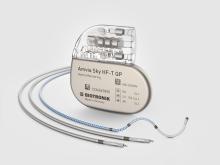Ask Your Doctor
Moderate physical exercise is usually safe and recommended for patients with an implanted cardiac device. But what is moderate physical exercise? That is quite subjective, but as a rule of thumb it means that you get enough movement that you know you are exercising but you are not exhausting yourself. Your physician can help you develop an exercise program tailored to your needs and abilities and may advise which heart rate during exercise is ideal for you. He or she can assess what you can do, which is usually much more than you would expect.
- Before you start, let your doctor or nurse check that the wound has healed properly.
- Decide together which types of exercise, at which level, are best for you and that you enjoy.
- Ask your doctor about any limitations and precautions you should take.
- In case you are interested, also ask your doctor how your cardiac device will adjust to your higher heartbeat while you exercise.
- Rough contact sports where your chest can get hit should be avoided (e.g. boxing, martial arts, rugby).
- Other sports may be possible while wearing appropriate chest padding (i.e. soccer).
- Sports with pronounced arm movements (e.g. tennis, golf, climbing, volleyball, basketball) may increase the risk for damage to the leads of your device.
- Implantation on the opposite side of the dominant arm (e.g. on the left side in a right-handed tennis player) may decrease the risk of damage or dislodgment of your device’s leads.
Please note that for high-risk patients or in case you feel uncomfortable to exercise alone, some cities offer cardiac exercise groups where training is medically directed and monitored.

Endurance Sports Are the Best Option
Regular exercise strengthens the heart and boosts circulation. By pumping more blood through the body with each beat and beating less often, your heart doesn’t have to work as hard. Exercise can also increase vessel volume, helping them become more elastic. Studies show that moderate endurance sports, such as Nordic walking or jogging, reduce the risk of heart attack and lower blood pressure.
In addition to your increased fitness level and better health, endurance sports also improve your overall sense of well-being. Working out on an exercise bike, using cardio equipment (treadmills, stairmasters, cross-training machines, etc.), biking, swimming, inline skating and cross-country skiing are all suitable activities.
And no worries if you don’t consider yourself a gym rat: Everyday life presents plenty of opportunities to be active. Taking the stairs instead of the elevator, going for longer and more regular walks and enjoying some fresh air are all meaningful small steps towards a healthy lifestyle.

Weight Training
Strong body muscles protect the heart and bones from harm. Lifting weights is an effective addition to endurance training. It is advisable to do many repetitions with low weights. Before starting, discuss whether weight training is right for you, and at what intensity, with your physician.



